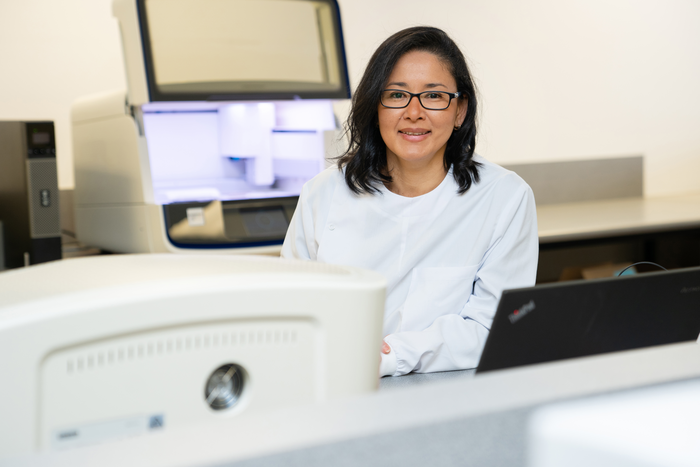Lung cancer is the deadliest form of cancer, accounting for an estimated 1.8 million deaths worldwide.

Credit: Edith Cowan University
Lung cancer is the deadliest form of cancer, accounting for an estimated 1.8 million deaths worldwide.
Treatment for the condition has improved in recent years — and a new Edith Cowan University study has found how to make it even more effective.
Immunotherapy has emerged as a major weapon in the battle against non-small cell lung cancer, which makes up 80-85 per cent of all lung cancer diagnoses.
Unfortunately, immunotherapy can also result in severe side effects for patients: at least 74 per cent of those treated will experience immune-related adverse reactions.
Up to 21 per cent will develop grade three or four toxicity, which can lead to lifelong complications affecting the skin, gut, liver or endocrine system.
These adverse reactions can result in cancer treatment having to be discontinued, which risks allowing the disease to progress further.
But, somewhat contradictorily, people who experience these immunotherapy side effects tend to have more positive results with their cancer progression than those who don’t.
Study supervisor Associate Professor Elin Gray, from ECU’s Centre for Precision Health, described immunotherapy is something of a “double-edged sword” — but researchers have made a critical breakthrough.
“Immunotherapies unleash the immune system to recognise and kill cancer cells,” she said.
“But they can also unleash the immune cells to attack the body, causing toxicities.
“Our research shows for the first time that certain genetic features predispose cancer patients to develop side effects or toxicities to anti-cancer therapy.”
“Knowing this will allow doctors to improve the treatment given to patients.”
‘HLA’ discovery benefits all
The key to the research are human leukocyte antigens, or HLAs, which are markers found in most cells in the body.
The immune system uses HLAs to determine which cells do and don’t belong in your body and are part of the alarm system which detects viruses, infections – and cancer.
The research team examined the HLAs of 179 non-small cell lung cancer patients and found a strong link between the genetic makeup of the HLAs and whether the person was likely to develop side effects from immunotherapy.
Study lead Dr Afaf Abed said this discovery would benefit all non-small cell lung cancer patients, regardless of whether they were genetically predisposed to adverse reactions to immunotherapy or not.
“If someone is found to not be at risk of side effects, doctors can ramp up the treatment and be more aggressive in fighting the disease,” she said.
“If they are found to be at a higher risk, doctors can take it easier with the treatment, monitor it and intervene before patients develop grade 3 or 4 toxicity.
“Either way, biomarkers that predict the risk of these immune-mediated adverse events among patients may reduce the risks associated with these treatments.”
‘HLA genotype association with the development of immune related adverse events (irAE) in patients with non-small cell lung cancer (NSCLC) treated with single agent immunotherapy’ was published in the European Journal of Cancer.
Journal
European Journal of Cancer
DOI
10.1016/j.ejca.2022.05.021
Method of Research
Randomized controlled/clinical trial
Subject of Research
People
Article Title
Human leucocyte antigen genotype association with the development of immune-related adverse events in patients with non-small cell lung cancer treated with single agent immunotherapy
Article Publication Date
25-Jun-2022
COI Statement
Dr Millward sits on advisory boards for Merck Sharp and Dohme (MSD), Bristol-Myers Squibb (BMS) and AstraZeneca (AZ). Dr Bowyer reports advisory board role for Sanofi and virtual meeting sponsorship from Bristol-Myers Squibb and MSD Australia. Dr Gray has received travel support from MSD. All remaining authors have declared no conflicts of interest.




